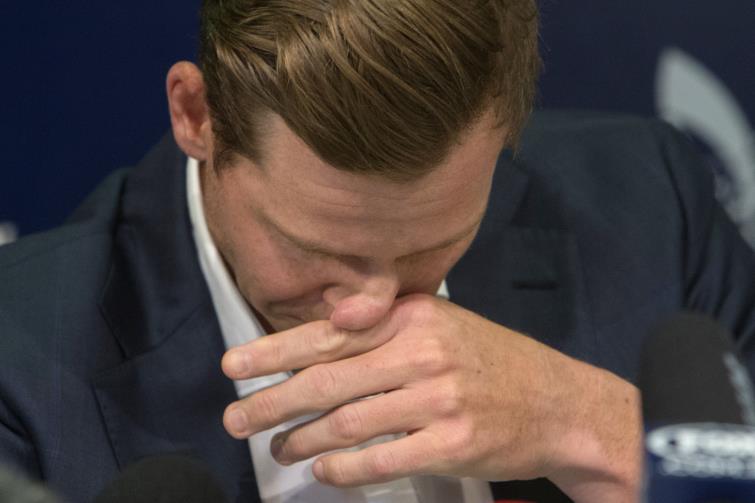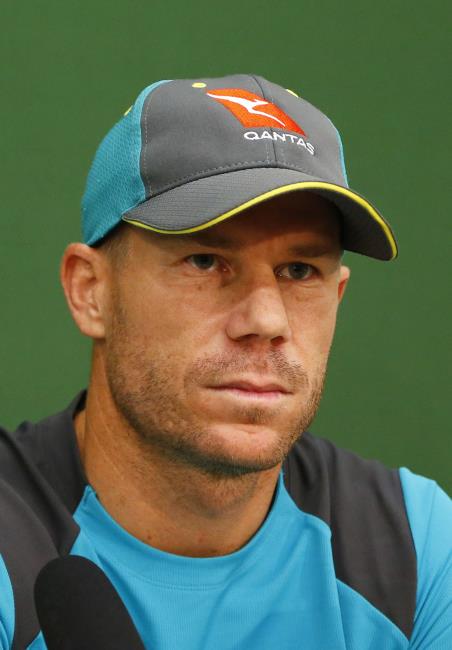Australian cricket is tainted by ball tampering scandel
Let’s not kid ourselves, the truth is still out there.
Australian captain Steve Smith, vice-captain David Warner, and Cameron Bancroft have all been dealt with severely by Cricket Australia in the wake of one of the game’s most bizarre scandals. Coach Darren Lehmann meanwhile, dubiously exonerated by authorities, was originally defiant before yesterday announcing his decision to resign following their test series with South Africa.
Whether the punishments fit the crimes is open to debate. But cricket has been disgraced, and any time a foreign object is implemented to gain an advantage in sport - whether it be sandpaper, blood capsules, or a simple roll of tape, the penalties should be severe.
Tearful remorse – and defiant silence from the instigator

The right noises have now inevitably been made. In complete contrast to his press conference in the midst of that controversial third test in South Africa, Smith has issued tearful remorse at a mistake he says will haunt him for the rest of the life. Given the excessive income he now stands to lose through sponsorship, IPL contracts, and Cricket Australia wages – I have no doubt he means it.
Warner meanwhile, accepted his responsibility via Twitter, while in contrast, Bancroft at least had the courage to face the music in person upon his return to Perth. Opinion is divided as to whether the latter is a naive youngster railroaded into controversy, or simply a cheat who got caught.
The debate is not so balanced when it comes to Warner, for so long a devout ambassador of idiocy and hypocrisy, and now branded the chief instigator of the whole debacle.
Lehman changes his mind and leaves
Lehmann, who of course had no prior knowledge of the plan, at first vowed to initiate a change of culture within his squad. Although that shouldn’t have been difficult, given he’s assured us this was purely an isolated incident that’s never occurred before. He will therefore walk away from his role with his honour intact, and his conscience clear.
You can probably sense the sarcasm.
Of course, it is easy for all of us to preach from our moral high ground, and many are revelling in the chance to kick cricket’s most divisive, and let’s be honest successful, international team when they are down.
People in glass houses
In Britain, we tend to be masters at pointing the finger whilst ignoring our own failings. English cricket itself has been anything but a bastion for flawless behaviour in modern times, and the rank inconsistencies that plague our disciplinary measures remain. For reference, type ‘Kevin Pietersen whistling’, ‘Ben Stokes fighting’, or ‘Andrew Strauss expletive’ into google, and if you can work out the ECB policy on indiscretions, you’re a better man than me.
And to be clear, regardless of what went on in the Ashes, England’s 4-0 hammering was down to the major failing of the tourists on and off the field, not the odd bit of reverse swing.
Beyond belief
But, are we seriously meant to believe that such an intricate and complex plan to boost Australia’s attack in Cape Town was concocted hastily over a spot of lunch?
Are we meant to believe that Mitchell Starc and co were set to steam in with no prior knowledge the ball they were using had been ‘worked’ on?
And best of all, are we meant to believe the words of Lehmann and the verdict of Cricket Australia, which suggested there were only three perpetrators and never before had such folly taken place?
The back story has altered dramatically since Smith himself seemingly revealed the plan was put together by a team leadership group. You don’t need to read the justifiable scepticism of Michael Vaughan, or watch the TV footage of an uncomfortable Lehmann ducking questions on reverse swing, to spot the gaps in the defence.
Is the full truth out yet?

In fact, as confessions go, the ones offered by Smith and co have been up there with Lance Armstrong on Oprah. Being caught has forced admissions – just ones that don’t add up.
It’s easier said than done, but revealing the full truth, or to put it more bluntly, the extent of their cheating, would have been the only way the Australian side could have even began to save face. At least then, they would have won reluctant praise from some quarters for coming clean and taking things on the chin. Instead, individuals remain protected, and suspicion remains rife.
Cricket Australia has followed suit. James Sutherland’s demeanour is that of a man clearly disturbed by what has gone on, but throwing the book at the three main culprits masks them dodging the brutal truth. Being seen to act swiftly and decisively is one thing, having the bravery to properly deal with the issue is another.
And by absolving the head coach of blame, and going along with the line that Australia’s bowlers were oblivious to the fact they were about to start bowling bananas, they have ensured that conspiracy theories, off-record investigations, and difficult questions will continue to fly their way. And they only have themselves to blame.
A previous admirer of Aussie set-up
The irony of the above article is I have long been in the minority not against the hostility which the Australian cricket side have become notorious for. I was out in the country for the 2006/07 Ashes series, where the determination and aggression displayed by players and fans alike made a lasting impression on me. Yes, some of their alleged ‘sledging’ has often crossed the line, but when you are in the back yard of a team with one of the most historic prizes in sport on offer, you don’t expect mild mannered robots. For a visiting player, winning ‘down under’ represents the ultimate test of mental toughness and ability under pressure. And I like that.
Even their media I’ve often begrudgingly admired. Whether it be an Ashes series, a Lions tour, or any other UK based side on their land, they’ve tended to sail close to the wind in terms of slander and defamation. But you can’t fault their loyalty, and whenever one of their international sides has struggled, such as 2010/11 when they relinquished the urn on home soil so emphatically, they’d sooner ignore the issue that photoshop pictures of a national coach or captain with a turnip on his head.
And finally . . .
So the fact that as a nation, the Australian journalists and public have now turned on a team it has traditionally adored, speaks volumes.
'I know I'll regret this for the rest of my life, I'm absolutely gutted. I hope in time I can earn back respect and forgiveness,” said an emotional Smith yesterday.
He, his departed coach and his teammates cannot take back the cheating, but unless the truth, the whole truth, and nothing but the truth comes out promptly – then the disgraced golden boy of Australian cricket can forget the last bit too.
As for Lehmann and Cricket Australia, the successful legacy built up in recent years has already been severely stained. Keep up this charade, and it will soon be washed away forever.